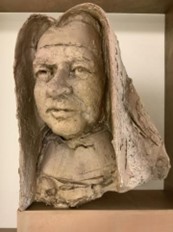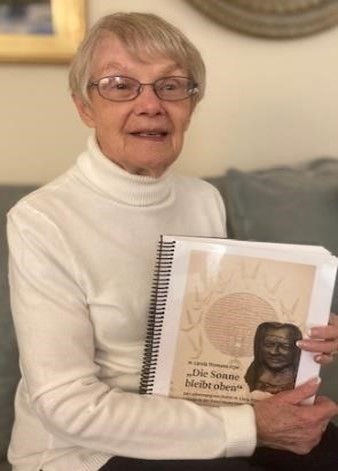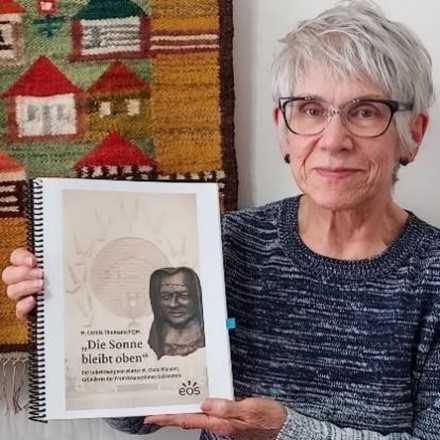Weavings is a monthly reflection that is the collective effort of the Wheaton Franciscan Covenant Companions and Sisters to provide spiritual nourishment that helps us feel God’s presence in daily living and invite an openness to God.
Finding Mother Clara
By Covenant Companion Book Club 2023

This reflection, while telling the story of Mother Clara Pfaender, is also very much the sharing of a group of Covenant Companions as they read and prayed and shared their responses to our founder’s life. During Winter 2023, the following Covenant Companions—Naomi Hroncich, Lauren Master, Joanne Pfeifer, Jeanne Guilfoyle, Dave Pfeifer, Consuelo Cabral and Carol Sejda—joined together to explore the research about Mother Clara, which had been compiled by Sister Carola Thomann. This work, titled Die Sonne Bleibt Oben (The Sun Remains Above), was the focus of discussion over several weeks. The initial interest of the Book Club was to learn about the humiliating expulsion of the beloved leader of our congregation and her resulting poverty and lonely death.
However, we wanted to go further and gain a greater understanding of the woman and the founding of the Franciscan Sisters, Daughters of the Sacred Hearts of Jesus and Mary. Another goal was to appreciate the Kulturkampf and the effect on Mother Clara and the congregation. The Kulterkampf was the cultural struggle that occurred between the German government and the Catholic Church in the 1870s. Finally, we wanted to explore her legacy and the impact on our lives today as Covenant Companions.
The first session of the Book Club focused on the early years of Theresia Pfaender who was born in 1827. Readers felt Theresia even as a girl was very self-aware and goal directed. She followed through on requirements her Protestant father presented without fuss and moved on, certain in her path and of her father’s ultimate permission to be a Catholic religious sister. One Covenant Companion offered the insight that in today’s world, Mother Clara would have supported the Women’s Movement. She worked comfortably in a male-dominated environment, whether assisting her father who was the mayor of Hallenberg or collaborating with Bishop Martin. As Clare did, in the time of St. Francis, Mother Clara was willing to stand up to the male church hierarchy. It was also noted that Mother Clara seemed to be of fragile health yet she persevered. One member saw a parallel to the suffering Francis.

Another Companion noted that Mother Clara’s early experiences of loss (deaths of both her mother and first step-mother) both prepared and foreshadowed future losses in her life. Caring for a large number of siblings certainly helped to develop organizational skills and a passion for teaching orphans.
During the second session, we chose to look at the developing congregation and the impact of charism on the sisters’ of St. Francis ministries. The Book Club felt the growth of the congregation was the result of Divine Inspiration in spite of the degree of poverty that the sisters endured. Our reading group was very aware of the tenaciousness of Mother Clara and the sisters’ generosity of spirit. The sisters also proved courageous in caring for those at war and those who suffered the frightening contagious diseases of the era. Several readers addressed the “positive” effect of the Kulturkampf in the expansion of the community to other countries. One Companion focused on part of our current “Vision Prayer”: “Open our hands to serve the needs of our time.” This statement is valid now and it was valid in the 1870s.

The congregation’s charism of love was a pertinent part of the discussion. In the early days of their development, devotion to the Blessed Sacrament, care and education— especially of orphans— then evolved to encompass care of the sick. The Founding Constitution included the sentence: “No manner of loving service for which the Lord gives them opportunity shall be excluded from their loving concern….” It was noted that Mother Clara felt isolated in her leadership role and turned to heartfelt prayer.
One Covenant Companion recalled a quote where Mother Clara said “I have more friends in heaven than on earth.” Nevertheless, she fostered the independent spirit of the sisters to live the charism and make the world a better place through the loving gift of their care to the most vulnerable. Another Companion shared that this courage is present today as we see that, even though the numbers of Wheaton Franciscan Sisters have decreased, their spirit is vital.
The third Book Club session focused on the Kulturkampf, the secret “Plenary Powers” bestowed on Mother Clara by Bishop Martin, and the unrelenting chaotic developments that greatly impacted Mother Clara and the congregation. This session called forth a full range of emotions from the readers. All agreed that these events had devastating results for the Catholic Church in Germany and many victims resulted. After being arrested and jailed, Bishop Konrad Martin entrusted Mother Clara with powers to enable continuance of their mutual vision of a Franciscan religious community that focused on loving service. Some readers voiced that Bishop Martin and Mother Clara were mutually respectful at a time when women’s roles in the Church were often treated dismissively. Other Companions felt that by providing Mother Clara with the ability to take extraordinary and unprecedented activities while he was jailed, Bishop Martin placed a heavy burden on Mother Clara. It was noted that she acted alone in a straight-forward manner placing her trust in God. From our 21st Century perspective, some raised questions about Mother Clara’s fierce commitment to a path that was sure to raise questions and have consequences.
The Book Club also focused on the responses of the Church hierarchy and the sisters in the community to the accusations leveled against Mother Clara, especially after false stories appeared in the news. The sisters were in turmoil and confused. In particular, the activities and negative gossip of Father Klein (Ecclesiastical Superior for the congregation) and Sister Germana Bais (Assistant to Mother Clara) seemed to accelerate the expulsion of Mother Clara. What the group found especially upsetting was having the Superiors of each of the Daughter-Houses being called together by Father Klein to vote “whether they remain connected to the Congregation in faithful Ecclesiastical obedience or if they want to stand with the excommunicated Mother Clara.”

How Mother Clara must have suffered with the vote of her sisters! One Covenant Companion focused on Mother Clara’s expression of the “deep pain felt in my soul” when she was denied Holy Communion. Another participant drew a parallel between Mother Clara and Francis who, near the end of his life was shunted to “the edge of the inside” of his community. This deep probing of a painful chapter of our congregation’s history left some book club participants distressed. One companion stated that it was overwhelmingly like watching a Greek tragedy. Nevertheless, we proceeded to the fourth and final session to consider the effect of our founder’s expulsion and final days.
In the immediate aftermath of Mother Clara’s dismissal from the congregation in 1880, multiple changes occurred. Under Father Klein’s direction, a different sister assumed the leadership role, Mother Clara’s name was obliterated from the congregation’s history and sisters were ordered not to speak of the past. One Covenant Companion referred to it as Mother Clara’s personal experience of crucifixion as she was isolated and humiliated. Nevertheless, she wrote: “I have forgiven from my heart all my enemies and opponents and I pray for them daily. I sacrificed everything: my country, my office, my sphere of activity, my profession, my honor and good name, even my poor daily bread. Nevertheless, my joy is unbroken, and I will not seek to justify myself.”

In February, 1881, Mother Clara and a volunteer sister-companion moved to Rome with plans to appeal to the Pope about her situation. The readers were humbled by her life in Rome. Besides continued attempts to contact Church leaders, she never abandoned the idea of service and hoped to develop a ministry for orphans in Rome. She also sought to establish “a little oratory” in her residence where she might keep and adore the Blessed Sacrament. She did not succeed in any of these endeavors. She also did not receive the annuity promised by the congregation. This resulted in unstable living situations and the need to rely on the charity of others. The Book Club members were so touched by her ongoing reverence for the Church and the fact that she sought comfort in multiple churches in Rome as her health continued to deteriorate.
She developed a serious illness and died on October 5, 1882, at the age of 54. Several Covenant Companions shared their experiences of following in Mother Clara’s footsteps while in Rome which touched the rest of us.
Since much documentation was lost or destroyed in the aftermath of Mother Clara’s dismissal and death, she remained lost to the congregation for many years. However, our reading group realized that many sisters were long-troubled by this aspect of the congregation’s history. Slowly the path was opened to recognize Mother Clara as founder and to review this tragedy. Fortuitously, discovery of the original Constitution and the Plenary Powers written by Bishop Martin increased the impetus to reclaim Mother Clara. Early books, The Burning Seal and Light into the Darkness, continued the effort and lastly Sister Carola Thomann’s definitive research culminated in the “rehabilitation” of Mother Clara. On February 18, 2018, Mother Clara was restored to a place of honor.
The Book Club then reviewed some key lessons gleaned from Mother Clara’s life. She was stripped of everything in both human and church arenas, yet she remained humble and trusted in God. One reader described her life as a great example of facing adversity without becoming bitter—never losing her heart or soul. Another Covenant Companion noted that Mother Clara’s tie to Francis remained strong throughout her life. She remained forward thinking on how she could serve. The group concurred that Mother Clara’s spirit is still alive in the hearts of members of our congregation. Her suffering is part of who we are, yet we have joy in remembering this courageous woman and the souls she touched directly and through the lives of the sisters.

As we close this reflection on The Sun Remains Above, our Book Club members are all grateful that we accepted the challenge to read Sister Carola’s research. There was general agreement that this was not an easy reading experience and we valued each other’s support to discuss and clarify. Together we arrived at a deeper sense of who Mother Clara was and who we are as Covenant Companions following the markers of love and faithfulness she left for us.

